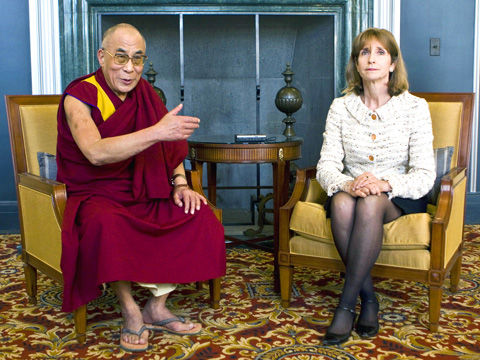The Dalai Lama asked Washington for help on Monday in improving the situation in Tibet, in the highest level meeting with the US administration since Beijing’s crackdown in his homeland.“At this moment we need your help,” he told the US special envoy on Tibet, Undersecretary of State for Democracy and Global Affairs Paula Dobriansky, as they met in Michigan, adding that the issue of Tibet was “very significant.”
Dobriansky reiterated a US appeal for dialogue between Beijing and the Dalai Lama, saying the Bush administration “has expressed concern and has urged restraint” in the Himalayan region.
“[US] President [George W.] Bush steadfastly supports the need for dialogue and today’s meeting offers an opportunity to discuss Tibet with His Holiness,” she told reporters.

PHOTO : AP
It was Dobriansky’s 12th meeting with the Dalai Lama aimed at finding a way to resolve the Tibet issue amicably, the State Department said.
“We want to hear from him about his ideas and what he believes might be the next appropriate steps in this,” department spokesman Tom Casey said.
“We are certainly going to, of course, also continue to have discussions with the government of China about this,” he said.
Meanwhile, China yesterday condemned both Dobriansky’s meeting and a decision by Paris city councilors on Monday to make the Dalai Lama an honorary citizen of the French capital, saying the move had hurt relations.
“China expresses its strong dissatisfaction and resolute opposition” to the honor, Foreign Ministry spokeswoman Jiang Yu (姜瑜) said in a statement posted on the ministry’s Web site.
“This interferes rudely with China’s internal affairs and seriously harms the Sino-French relationship, and in particular the existing friendly ties between Paris and Beijing,” she said. “The fact that this moment the Paris city council decides to make the Dalai Lama an honorary citizen can only be seen as a serious challenge to 1.3 billion Chinese including Tibetans.”
“China requires that France immediately take effective steps to remove the severely negative impact of its erroneous action,” she said.
The Paris councilors voted to award honorary citizenship to the Dalai Lama and Hu Jia (胡嘉), the human-rights activist who was jailed in China earlier this month on charges of attempted subversion.
Jiang also told reporters in Beijing yesterday that China did not agree with “individual radical actions,” referring to unruly scenes that evolved during anti-Western protests targeting the stores of French retailer Carrefour last weekend.
Also See: Jakarta holds torch relay under guard

MORE VISITORS: The Tourism Administration said that it is seeing positive prospects in its efforts to expand the tourism market in North America and Europe Taiwan has been ranked as the cheapest place in the world to travel to this year, based on a list recommended by NerdWallet. The San Francisco-based personal finance company said that Taiwan topped the list of 16 nations it chose for budget travelers because US tourists do not need visas and travelers can easily have a good meal for less than US$10. A bus ride in Taipei costs just under US$0.50, while subway rides start at US$0.60, the firm said, adding that public transportation in Taiwan is easy to navigate. The firm also called Taiwan a “food lover’s paradise,” citing inexpensive breakfast stalls

TRADE: A mandatory declaration of origin for manufactured goods bound for the US is to take effect on May 7 to block China from exploiting Taiwan’s trade channels All products manufactured in Taiwan and exported to the US must include a signed declaration of origin starting on May 7, the Bureau of Foreign Trade announced yesterday. US President Donald Trump on April 2 imposed a 32 percent tariff on imports from Taiwan, but one week later announced a 90-day pause on its implementation. However, a universal 10 percent tariff was immediately applied to most imports from around the world. On April 12, the Trump administration further exempted computers, smartphones and semiconductors from the new tariffs. In response, President William Lai’s (賴清德) administration has introduced a series of countermeasures to support affected

CROSS-STRAIT: The vast majority of Taiwanese support maintaining the ‘status quo,’ while concern is rising about Beijing’s influence operations More than eight out of 10 Taiwanese reject Beijing’s “one country, two systems” framework for cross-strait relations, according to a survey released by the Mainland Affairs Council (MAC) on Thursday. The MAC’s latest quarterly survey found that 84.4 percent of respondents opposed Beijing’s “one country, two systems” formula for handling cross-strait relations — a figure consistent with past polling. Over the past three years, opposition to the framework has remained high, ranging from a low of 83.6 percent in April 2023 to a peak of 89.6 percent in April last year. In the most recent poll, 82.5 percent also rejected China’s

PLUGGING HOLES: The amendments would bring the legislation in line with systems found in other countries such as Japan and the US, Legislator Chen Kuan-ting said Democratic Progressive Party (DPP) Legislator Chen Kuan-ting (陳冠廷) has proposed amending national security legislation amid a spate of espionage cases. Potential gaps in security vetting procedures for personnel with access to sensitive information prompted him to propose the amendments, which would introduce changes to Article 14 of the Classified National Security Information Protection Act (國家機密保護法), Chen said yesterday. The proposal, which aims to enhance interagency vetting procedures and reduce the risk of classified information leaks, would establish a comprehensive security clearance system in Taiwan, he said. The amendment would require character and loyalty checks for civil servants and intelligence personnel prior to